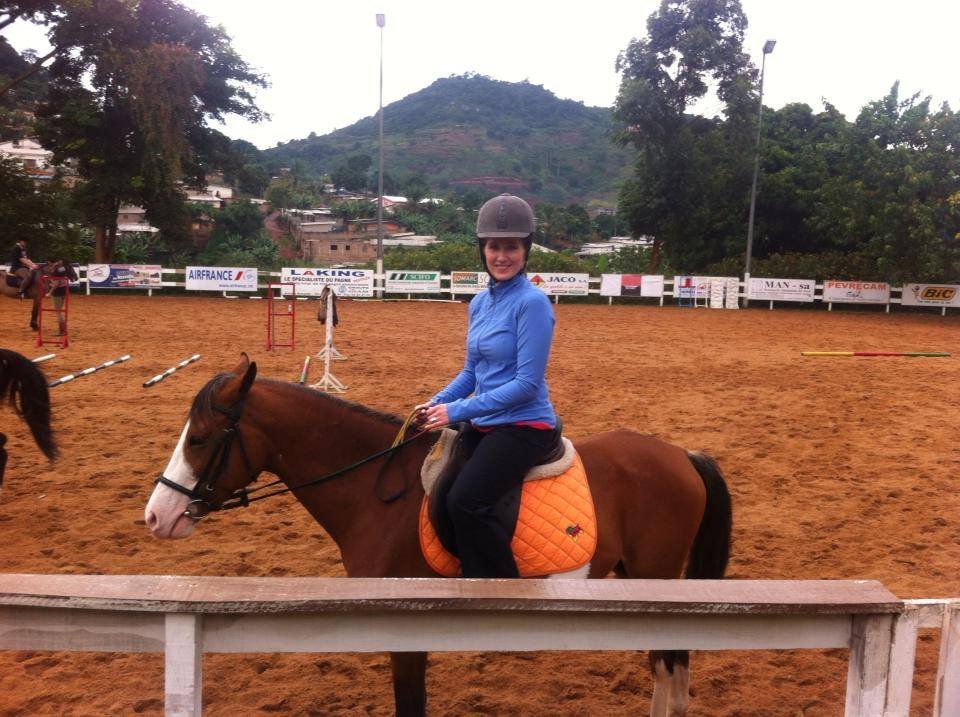I was in Cameroon at the beginning of September. “The Cameroons,” my uncle called it, accidentally. It was a term used when part of present-day Cameroon was under British colonial rule and administered as two areas. But I didn’t know that at the time he said it, so I laughed.

“No,” I said, “you’re thinking of macaroons, which should always be consumed in plural.”
There’s a feeling that anything could happen in Cameroon, but nothing will as long as the government maintains its repressive control. Every fourth person is in “security,” they say, working undercover for internal affairs. The environment doesn’t lend itself to trust, let alone meaningful civic engagement. It reminds me of the tenuous sense of community present across the former Soviet bloc, where a common refrain was, “If you’re not stealing from the government, you’re stealing from your family.”
I write as though civic engagement is a given in the U.S., as though everything is in order here. But of course it’s not.
A couple of days after I returned, I went to a coffee shop to work on some things near (but not with) people, as I like to do sometimes. I was typing when I heard a woman standing near the counter release a sigh. I recognized the undirected sigh, the kind let out when you feel defeated.
“You okay?” I asked. She murmured a response about getting into it with her husband and not knowing what to do. Then I noticed that she was carrying a big bag–a trash bag–filled with belongings. She asked the barista for a glass of water and thanked me for asking how she’s doing.
“You want a cup of coffee?” I asked. “It’s on me.”
The barista poured her a cup of coffee and she sat down. Truth be told, I hadn’t meant to invite her to sit down, but she looked relieved. Her bright red lipstick was evenly applied across her mouth, setting off her bright white teeth, two of which were missing.
My own teeth were clenched and my eyes narrowed as she described her husband’s behavior toward her. She wanted to inspire him to do better. “You’re only responsible for yourself,” I said firmly, wondering how this conversation started. “He is not your responsibility.”
“But what’s my responsibility as a wife?” she asked with a bewildered look in her eyes. A wave of guilt washed over me as I thought of my own divorce for reasons that pale compared to emotional or physical abuse.
“I don’t know,” I exclaimed, and threw up my hands as though I could not be held accountable for anything that came out of my mouth. “All I know is that he’s not your responsibility.” And then I gave her a telephone number she could call for assistance with any number of issues.
It crossed my mind more than once that he may come into the coffee shop and accuse me of meddling, though I hadn’t asked even one question. I wondered if I should leave to avoid any such situation. And then I remembered that that’s exactly how fear works. No one wants to get involved because it doesn’t take much to make everyone afraid.
Her name was Antigone, she told me. “I was named after a Greek goddess, but I don’t feel nothin’ like a goddess.” She stared into the distance and repeated, “I don’t feel nothin’ like a goddess.”
And then we both burst out laughing, because there wasn’t much to dispute.
“I’ve been run over twice, shot at three times, and raped more than 10 times, but by the grace of God I don’t have AIDS,” she said, shaking her head. “I’ve got a story for the world,” she said in a weakly victorious tone. “I’ve got a story for the world, but right now,” her voice trailing off, “I’m just struggling with my husband.”
They’re living in a homeless shelter, but she was quick to explain that it wasn’t because they were evicted or anything like that, maybe a badge of honor when entering a homeless shelter. It was just that they’d been living in a bad place with too many drug users around them.
A contagious smile splayed across her lips as we spoke and she rubbed her front teeth to be sure there was no lipstick on them. Her eyes were a warm shade of brown, brimming with kindness, not unlike those of the barista who wouldn’t let me pay for her coffee after all.
“It’s just coffee,” he said as he waved me away.
Antigone waved, too, when I looked through the window behind me to watch her walk down the street. She flashed her smile and waved. And then I turned to resume my typing, heart heavy with reality, but buoyed by the spirit of a goddess.


When I last worked in Yaoundé (before the ‘Goddess’ was born :-), I was told the reason an ‘s’ is sometimes used at the end of the country’s name, is because Cameroon was originally a German colony. During WWI, French and British colonial forces moved-in from both sides and claimed each a good chunk, which became French and British Cameroun (but as the author states correctly, even the British part was sub-divided, one part preferring Nigeria to Cameroon). The two chunks were re-united at independence. This is why (although Cameroun has some 220 local languages) you have anglophone and francophone Camerounians. There are also those who, like in Namibia, still speak German.
Thank you, Antoine jan!